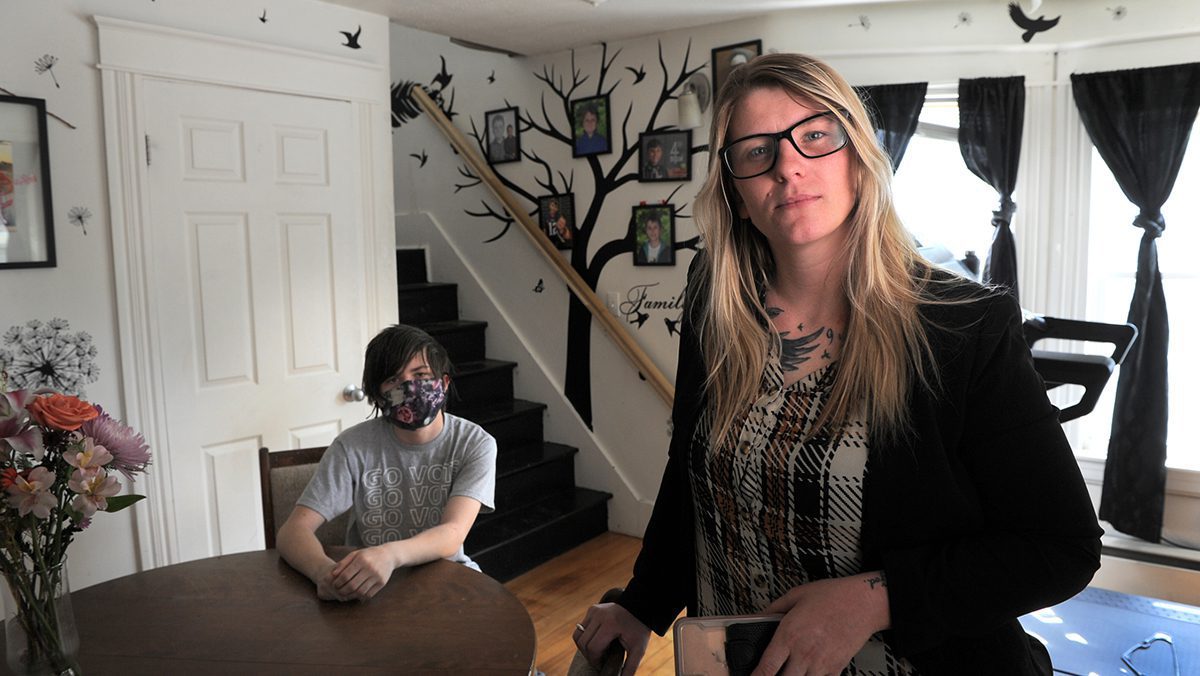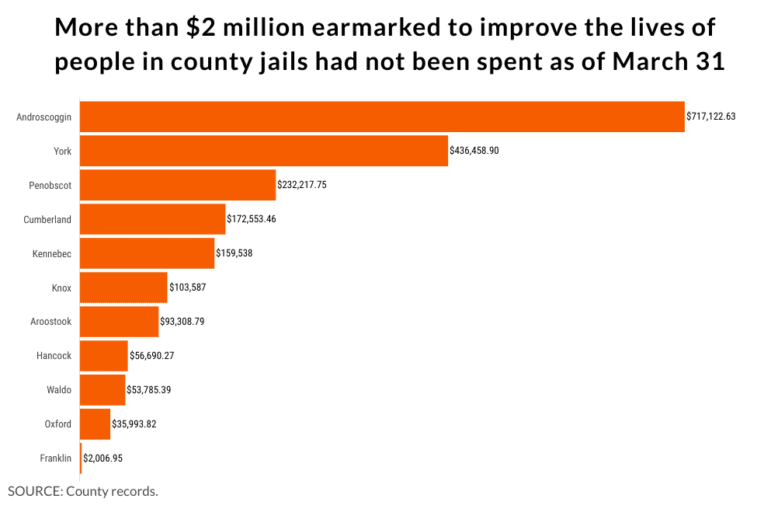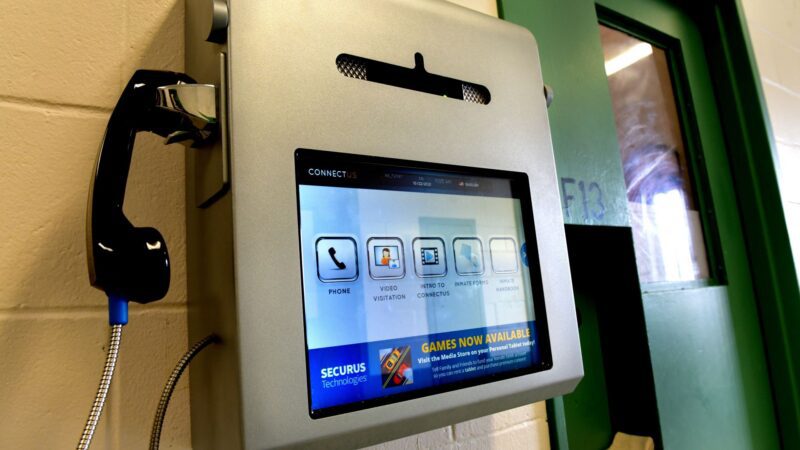Maine prisoners may have access to cheaper phone calls after state lawmakers agreed to eliminate some fees and cap prices at rates set by the Federal Communications Commission at jails and prisons.
The revision to state law is a small but meaningful step for families of incarcerated people, who sometimes struggle to afford phone calls due to high per-minute rates and fees. Prisoners cannot shop for the best phone plan and must pay the rate negotiated by the facility with a private company. In Maine, that can amount to thousands of dollars for each family.
“Incarceration is a family affair,” said Commissioner Randall Liberty, who oversees the state Department of Corrections and whose father spent time in Maine State Prison. “Just like addiction and mental health is, the whole family is involved in this and unless we have good human contact, it doesn’t go well.”
The new law sets a ceiling on the per-minute price Maine jails and prisons can charge inmates to make a phone call and ties it to the interstate rate set by the FCC. The current interim rate cap set by the FCC for prison calls is 12 cents per minute, and 21 cents per minute at jails with less than 1,000 residents, which all Maine county jails fall beneath. In some cases, the new law also allows for limited, free calls for prison inmates with low balances in their jail accounts.
“I’m beyond ecstatic. This is an example of good public policy where we all work together,” said Courtney Allen, who has advocated for years to lower the cost of calls in the jails.
Allen was unable to afford 15-minute calls at times between her son Wyatt, 14, and his father, who has been incarcerated off and on throughout his life. Allen said she has worked on several bills in the state legislature, but this was the most important for that reason.

The law doesn’t accomplish everything, Allen said. People in jail before trial and serving short sentences may pay up to 21 cents a minute for a phone call, and they will not receive expanded access to free calls with their family or lawyer like people in the state prisons.
The bill unanimously passed the Maine House and Senate, and was signed by Gov. Janet Mills.
Cap on costs
The FCC has worked for several years to lower what it characterizes as “egregiously high rates” charged to incarcerated people to make phone calls. The agency has capped interstate phone call prices, but courts have ruled that the FCC cannot regulate the price of in-state calls.
The Maine Department of Corrections currently charges prisoners 9 cents per minute through a contract with Legacy Inmate Communications. The department receives 5 cents back each minute, which is deposited in an account dedicated to providing resources to the prison’s residents.
The department’s contract with Legacy expires in June. The law does not take effect until Oct. 1 and only affects contracts renewed or renegotiated after that date.
The FCC’s interim rate cap allows prisons to negotiate for a 2-cent payment with call providers and bump the cap from 12 cents to 14 cents per minute, according to a spokesman for the federal office.
The Maine Department of Corrections is committed to staying at its lower current rate of 9 cents, Liberty said. But the significance of the new law is it can’t move higher than the FCC rate, ensuring that the state won’t force large increases in the future.
Money from the calls is used to pay for fitness equipment, sports leagues and music programs for prisoners.
A letter signed by 300 men at the Maine State Prison encouraged lawmakers not to strip the department of its ability to collect money from phone calls, said Olland Reese, who drafted the letter and is serving a 47-year sentence for murder. Phone calls cost 30 cents a minute earlier in his sentence, and the current rate was more reasonable, he said.
The law also will stop the state and phone service providers in the future from charging fees to connect a call or terminate a call before it connects at the prisons. Companies also will not be able to block calls to numbers without prior billing relationships and must offer a cost quote before connecting a call.
Prisoners in Maine with less than $10 in their facility account will also now have access to 30 minutes of free telephone time per week to talk with family as well as an additional 30 minutes to speak to their attorney, according to the law. The department anticipates paying for these calls from its general fund, Liberty said.
“I recognize the importance of the residents being able to communicate with their families. (It’s) critically important, regardless of what they have in their financial account,” Liberty said.
Different standards at jails
People in Maine county jails will not see the same drop in costs or free phone time.
County jails will still have the option to charge fees on connected and early terminated calls. Companies contracted with the jails to provide inmate phone services will also have the option to block a collect call to a person it does not have a prior billing relationship with, according to the law.
People in jail pre-trial or serving short sentences will also not receive free calls to families or their lawyers.
“The state should not profit off their incarceration and should do everything they can do to stay connected to their families,” said Meagan Sway, policy director for the ACLU of Maine.
The law is a “good start,” she said. Most people in jail are there prior to their conviction and there is more that could be done to help families stay connected, Sway said.
The Maine Sheriffs Association agreed to support the bill after free calls and prohibition on collecting fees were stripped from the jail section of the legislation. Maine’s elected sheriffs are responsible for the operation of county jails.
The sheriffs association did not respond to multiple requests for comment from The Maine Monitor.
Without the support of the sheriffs, the bill wouldn’t have passed, said Rep. Richard Pickett (R-Dixfield), who sits on the state Criminal Justice and Public Safety Committee that worked on the bill.
Pickett said he also wouldn’t have agreed to the bill if the money wasn’t coming back to benefit the inmates.
“It’s a step in the right direction and I feel good about that, and as long as it’s going to benefit the residents and they’re going to get things they didn’t have before, it’s a win-win,” Pickett said.
Rep. Charlotte Warren (D-Hallowell) credited the bill for moving “the ball down the field,” but there is more that should be done to lower costs and make prices consistent between county jails, she said. More education and conversations with sheriffs is needed.
“I guarantee you there will be a bill about this next session. There’s more to do. I don’t think this is going to go away,” said Warren, who has reached her term limit in the state House of Representatives.
Unspent revenue
Phone contracts are a lucrative revenue stream for correctional facilities. County governments can earn hefty commissions by agreeing to charge call rates well above market value.
The jails secure these rates through contracts with some of the largest prison telecom companies in the country, including Securus Technologies and GTL.
The money earned from the phone contract must be deposited in an “Inmate Benefit Fund.” Items purchased by the facility from the fund must benefit the people at the jail or prison, such as cable and newspaper subscriptions, substance use treatment, haircuts, sports equipment and enrichment programs. The money cannot be spent on expenses to operate the jail.
A percentage of every phone call a prisoner makes is paid back to the jails from the phone vendor.
Maine county jails collectively had $2 million sitting unspent in their inmate benefit funds as of March 31.
Androscoggin County had the largest balance of $717,122 in its inmate benefit fund at the end of the third quarter of the fiscal year.
The jail spent approximately $230,000 on haircuts, postage and phone calls for indigent inmates as well as a GED teacher at the Androscoggin County Jail, said Jail Administrator Major Jeff Chute. The pandemic has reduced the number of outside teachers and programs the jail has been able to offer, and there are plans to restart some this summer that will be paid for from the fund, he said.
Chute could not give a reason why the jail had not spent more money for inmates.
“It’s being spent,” Chute said. “We’ve always carried a pretty high balance. We’re pretty good with money here.”

At the end of last year, the department also had a $1.3 million balance across five facilities’ inmate benefit accounts, according to department financial records.
The fairly large unspent balance gives the department flexibility to address emergent needs and large purchases for the approximately 1,600 residents, Liberty said. He said the balance wasn’t “an excessive amount.”
The department spent $1 million in 2021 on services and programs paid by the prisons’ inmate benefit accounts, according to department financial records. The department spent $960,000 in 2020.
Several places have made phone calls free for prisoners, including New York City and San Francisco County. Connecticut also stopped making prisoners pay for calls last year.
Liberty opposed eliminating the state’s ability to earn money from prisoner phone calls because of the programs it funds. It could be detrimental to prisoners to tie funding to the state’s General Fund and the political will of the state legislature and governor’s office, he said.
“The political pendulum swings back and forth, as does the economy,” Liberty said.
The burden to pay for these programs is instead passed off to families, said Jan Collins, on behalf of the Maine Prisoner Advocacy Coalition. Taxpayers contribute to operating jails and prisons, but the cost of minimal benefits like recreational equipment, substance use programs, haircuts and cable “is foisted on people who are already financially stretched,” she said.
“Other states have done away with all charges for phone calls. If Maine is truly serious about community safety and rehabilitation of those who are incarcerated, it will follow the lead of those states,” Collins said.




